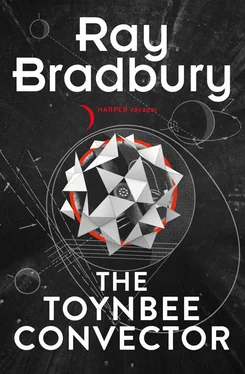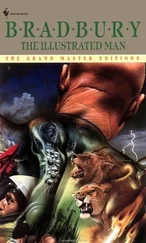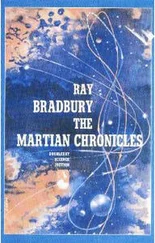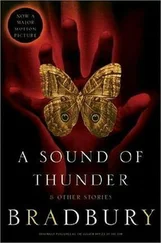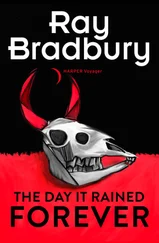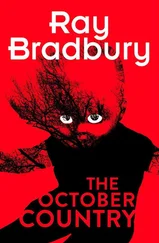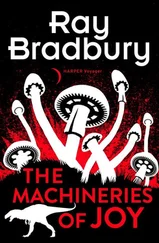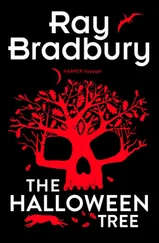He thought of Helen and he thought of Joseph. Joseph. Did it ever work out for you, Joseph; were you ever at the right place at the right time, and did all go well with you? There was no way of knowing; the brick city had taken Joseph and lost him in the tile subways and black elevateds and noise.
As for Helen, not only had she never known a night like this, but she had never dreamed of such a thing, there was no place in her mind for this.
So here I am, he thought quietly, thousands of miles from everything and everyone.
Across the soft black country now came the sound of a courthouse clock ringing the hour. One. Two. Three. One of those great stone courthouses that stood in the green square of every small American town at the turn of the century, cool stone in the summertime, high in the night sky, with round dial faces glowing in four directions. Five, six. He counted the bronze announcements of the hour, stopping at nine. Nine o’clock on a late spring night on a breathing, warm, moonlit hill in the interior of a great continent, his hand touching another hand, thinking, this year I’ll be thirty-three. But it didn’t come too late and I didn’t let it pass, and this is the night.
Slowly now, carefully, like a statue coming to life, turning and turning still more, he saw her head move about so her eyes could look upon him. He felt his own head turning, also, as it had done so many times in his imagination. They gazed at each other for a long time.
He woke during the night. She was awake, near him.
“Who are you?” he whispered.
She said nothing.
“I could stay another night,” he said.
But he knew that one can never stay another night. One night is the night and only one. After that, the gods turn their backs.
“I could come back in a year or so.”
Her eyes were closed but she was awake.
“But I don’t know who you are,” he said.
“You could come with me,” he said, “to New York.”
But he knew she could never be there or anywhere but here, on this night.
“And I can’t stay here,” he said, knowing that this was the truest and most empty part of all.
He waited for a time and then said again, “Are you real? Are you really real?”
They slept. The moon went down the sky toward morning.
He walked out of the hills and the forest at dawn, to find the car covered with dew. He unlocked it and climbed in behind the wheel, and sat for a moment, looking back at the path he had made in the wet grass. He moved over, preparatory to getting out of the car again. He put his hand on the inside of the door and gazed steadily out.
The forest was empty and still, the path was deserted, the highway was motionless and serene. There was no movement anywhere in a thousand miles.
He started the car motor and let it idle.
The car was pointed east where the orange sun was now rising slowly.
“All right,” he said, quietly. “Everyone, here I come. What a shame you’re all still alive. What a shame the world isn’t just hills and hills and nothing else to drive over but hills and never coming to a town.”
He drove away east without looking back.
The four cousins, Tom, William, Philip, and John, had come to visit the Family at the end of summer. There was no room in the big old house, so they were stashed out on little cots in the barn, which shortly thereafter burned.
Now the Family was no ordinary family. Each member of it was more extraordinary than the last.
To say that most of them slept days and worked at odd jobs nights, would fall short of commencement.
To remark that some of them could read minds, and some fly with lightnings to land with leaves, would be an understatement.
To add that some could not be seen in mirrors while others could be found in multitudinous shapes, sizes, and textures in the same glass, would merely repeat gossip that veered into truth.
There were uncles, aunts, cousins, and grandparents by the toadstool score and the mushroom dozen.
They were just about every color you could mix in one restless night.
Some were young and others had been around since the Sphinx first sank its stone paws deep in tidal sands.
In all, in numbers, background, inclination, and talent, a most incredible and miraculous mob. And the most incredible of them all was:
Cecy.
Cecy. She was the reason, the real reason, the central reason for any of the Family to come visit, and not only to visit but to circle her and stay. For she was as multitudinous as a pomegranate. Her talent was single but kaleidoscopic. She was all the senses of all the creatures in the world. She was all the motion picture houses and stage play theaters and all the art galleries of time. You could ask almost anything of her and she would gift you with it.
Ask her to yank your soul like an aching tooth and drift it in clouds to cool your spirit, and yanked you were, drawn high to drift in such clouds as sowed rain to grow grass and seed-sprout flowers.
Ask her to seize that same soul and bind it in the flesh of a tree, and you awoke next morning with apples popping out of your branches and birds singing in your green-leafed head.
Ask to live in a frog, and you spent days afloat and nights croaking strange songs.
Ask to be pure rain and you fell on everything. Ask to be the moon and suddenly you looked down and saw your pale illumination bleaching lost towns to the color of tombstones and tuberoses and spectral ghosts.
Cecy. Who extracted your soul and pulled forth your impacted wisdom, and could transfer it to animal, vegetable, or mineral; name your poison.
No wonder the Family came. No wonder they stayed long past lunch, way beyond dinner, far into midnights the week after next!
And here were the four cousins, come to visit.
And along about sunset of the first day, each of them said, in effect: “Well?”
They were lined up by Cecy’s bed in the great house, where she lay for long hours, both night and noon, because her talents were in such demand by both family and friends.
“Well,” said Cecy, her eyes shut, a smile playing about her lovely mouth. “What would your pleasure be?”
“I—” said Tom.
“Maybe—” said William and Philip.
“Could you—” said John.
“Take you on a visit to the local insane asylum,” guessed Cecy, “to peek in people’s very strange heads?”
“Yes!”
“Said and done!” said Cecy. “Go lie on your cots in the barn.” They ran. They lay. “That’s it. Over, up, and—out!” she cried.
Like corks, their souls popped. Like birds, they flew. Like bright unseen needles they shot into various and assorted ears in the asylum just down the hill and across the valley.
“Ah!” they cried in delight at what they found and saw.
While they were gone, the barn burned down.
In all the shouting and confusion, the running for water, the general ramshackle hysteria, everyone forgot what was in the barn or where the high-flying cousins might be going, or what Cecy, asleep, was up to. So deep in her rushing sleep was this favorite daughter, that she heard not the flames, nor the dread moment when the walls fell in and four human-shaped torches self-destroyed. The cousins themselves did not feel the repercussions of their own bodies being snuffed for some few moments. Then a clap of silent thunder banged across country, shook the skies, knocked the wind-blown essences of lost cousin through mill-fans to lodge in trees, while Cecy, with a gasp, sat straight up in bed.
Running to the window, she looked out and gave one shriek that shot the cousins home. All four, at the moment of concussion, had been in various parts of the county asylum, opening trapdoors in wild people’s heads and peeking in at maelstroms of confetti and wondering at the colors of madness, and the dark rainbow hues of nightmare.
Читать дальше
